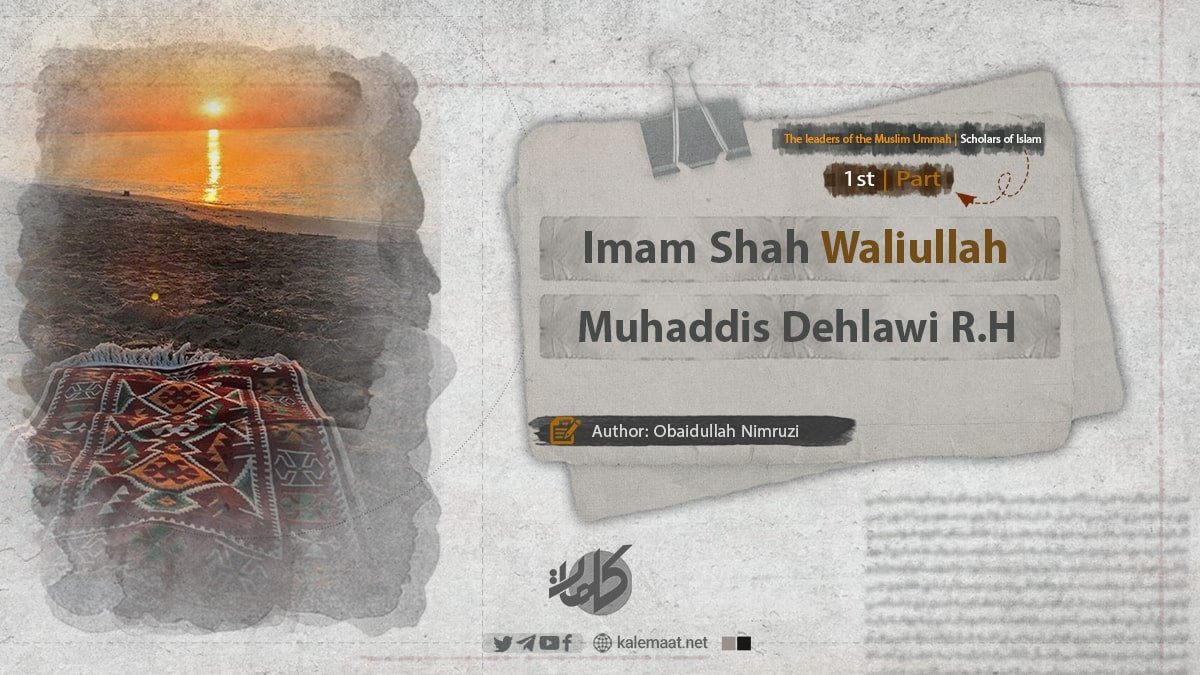
Author: Obaidullah Nimruzi
Imam Shah Waliullah Muhaddis Dehlawi (Part One)
Keywords: Muhaddis Dehlawi, Shah Waliullah, “Hujjatullah Al-Balaghah”
Abstract: Among the intellectual leaders and religious reformers of the Islamic world in the 18th century, “Imam Shah Waliullah Dehlawi” holds a prominent position. He was a luminous figure who guided the Muslims of that era towards the path of righteousness, peace, and glory during a tumultuous period in Indian history. Possessing profound vision, comprehensive knowledge, n of this great man, his thoughts and teachings laid the foundation for a powerful movement led by Shah Ismail Shahid and Syed Ahmed Shahid, which aimed to liberate Muslims from the clutches of Western imperialism.
Description of life and consequences
Qutbuddin Ahmad bin Abdul Rahim Dehlawi, known as “Shah Waliullah Dehlawi”, was birth four years after the death of Aurangzeb Alamgir, i.e. in 1114 AH 703 AD. The exact time of his ancestors’ migration from Arabia and their settlement in India is unknown; But this indicates that this migration took place about three hundred years after the emigration of the Holy Prophet, may Allah bless him and grant him peace. In historical documents, the authority of Shamkhi, whose ancestors were in the Mongol court, is clearly mentioned in these documents. The desire for dominance among the sons of Shah Jahan played an important role and showed courage in the war with the Marathi.
Shah Abdur Rahim, the father of Shah Waliullah, was loved and respected by the people because of his great knowledge, grace and piety.
Emperor Aurangzeb Alamgir assigned the important and sensitive task of revising the Fatwa of Alamgiria (Hindia Fatwa) to the aforementioned, and he honorably fulfilled his assigned task; But he refused to accept any kind of fee for this work.
“Shah Waliullah” in a treatise called «الجزء اللطیف فی الترجمة العبد الضعیف» has given a description of his brilliant student life; Even a cursory look at this pamphlet shows that Shah Waliullah was mature even as a child. He quickly became proficient in various fields of science and knowledge, and his knowledge of these sciences was such that at the age of fifteen, he could confidently teach all of these sciences to others.
After the death of his father, he started teaching the usual subjects in the schools of that time: Tafsir, Hadith, Fiqh and Logic, and during this period, which lasted for about twelve years, he deeply scrutinized the teachings of Islam and the future of Muslims in India.
In 1737/1143, Shah Waliullah went to Hijaz to perform the Hajj rituals, and there he studied the science of hadith and jurisprudence for fourteen months under the supervision of prominent scholars such as: Sheikh Abu Taher Kurdi Madani, Sheikh Wafdullah Makki and Sheikh Tajuddin Qali. During this period, he got to know the Muslims of other Islamic countries, and in this way, he got information about the conditions in different Islamic countries at that time.
He returned to Delhi in 1145/1733 and wrote many works until his death in 1176/1763 during the reign of secend Shah Alam. his most important work is “Hujjatullah Al-Balaghat” in which he tries to present the teachings of Islam in a scientific way, although his approach is radical from beginning to end; But it is without complete disconnection with the past.
The range of his writings is diverse and wide and includes all aspects of knowledge: economic, political, social, metaphysical and also pure theology. It is the first outstanding effort that presents a rethinking of the entire Islamic system in terms of scientific subjectivity.
Continues…


